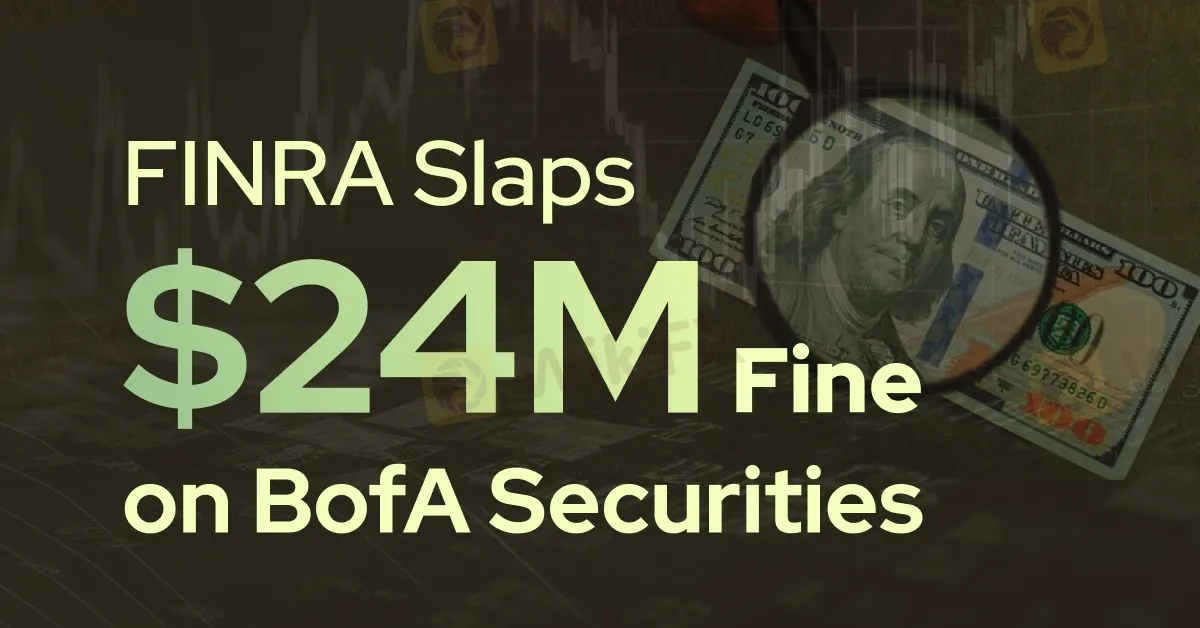简体中文
繁體中文
English
Pусский
日本語
ภาษาไทย
Tiếng Việt
Bahasa Indonesia
Español
हिन्दी
Filippiiniläinen
Français
Deutsch
Português
Türkçe
한국어
العربية
FINRA Slaps $24M Fine on BofA Securities
Abstract:FINRA levies $24 million fine against BofA Securities for alleged spoofing and supervisory failures, unveiling ongoing regulatory scrutiny across financial markets.

The Financial Industry Regulatory Authority (FINRA) has taken action against BofA Securities, imposing a significant fine of $24 million. This penalty comes as a result of the firm's alleged involvement in more than 700 instances of spoofing and associated supervisory shortcomings within the US Treasury secondary markets, spanning over a six-year period.
Spoofing, a practice involving deceptive orders to fabricate market activity, was reportedly employed by BofA Securities through two former traders in the US Treasury secondary markets from October 2014 to February 2021. The firm stands accused of engaging in 717 instances of spoofing during this time.
The Executive Vice President and Head of Enforcement at FINRA, Bill St. Louis, expressed concern, highlighting that spoofing undermines market transparency and integrity by distorting actual supply and demand. He emphasized that this action underscores FINRA's commitment to vigorously pursue firms involved in spoofing, including cross-product spoofing.
Throughout this duration, BofA Securities failed to establish and sustain a supervisory system capable of detecting spoofing activities in the US Treasury markets. Although a system was implemented by the company in November 2015, it remained inadequate until mid-2019, primarily detecting algorithmic spoofing and not manual manipulation by traders.

While BofA Securities has accepted FINRA's findings without admitting or denying the charges, it's worth noting that the company was previously fined $325,000 last year by FINRA for allegedly issuing inaccurate monthly reports for order execution.
The regulatory body disclosed that between January 2014 and February 2022, BofA Securities incorrectly reported order execution statistics for its two market centres, MLCO and MLIX. The company reportedly disregarded the requirement to present separate statistical information under Rule 605, leading to combined reports for both centres being published.
In a separate incident, Credit Suisse faced scrutiny when FINRA fined its US subsidiary $900,000 for deficiencies in regulatory reporting. The violations involved tardy trades and inaccurate reports from November 2015 to March 2023 on the Trade Reporting and Compliance Engine.
Earlier this year, Webull was subject to a $3 million penalty by FINRA. The focus was on the firm's oversight in onboarding options traders and the absence of adequate supervisory systems to identify and address customer complaints. This oversight led to the approval of roughly 9,000 unqualified traders, including more than 2,500 customers under 21 without the required options trading experience.

Disclaimer:
The views in this article only represent the author's personal views, and do not constitute investment advice on this platform. This platform does not guarantee the accuracy, completeness and timeliness of the information in the article, and will not be liable for any loss caused by the use of or reliance on the information in the article.
Read more

CySEC Revokes UFX Broker Licence as Reliantco Halts Global Operations
The Cyprus Securities and Exchange Commission (CySEC) has officially withdrawn the Cyprus Investment Firm (CIF) licence of Reliantco Investment Limited, the operator of UFX.com. This decision followed a six-month period during which the company failed to provide any investment services or perform investment activities.

Elon Musk Sparks Debate Over Presidential Power and Federal Reserve Independence
Elon Musk has voiced his support for the controversial idea that United States presidents should have a role in shaping Federal Reserve policies. This endorsement aligns with recent remarks from President-elect Donald Trump, who has hinted at revisiting the central bank's independence, a long-held tradition in the nation's financial governance.

Consob Sounds Alarm: WhatsApp & Telegram Users Vulnerable to Investment Scams
Italy's financial regulator, Consob, has raised alarms over an increase in fraudulent schemes targeting investors through mobile messaging platforms such as WhatsApp and Telegram.

Crypto 101: Coins vs Tokens
For those new to the world of cryptocurrency, terms like "coin" and "token" may seem interchangeable. However, understanding the distinction between these two digital assets is crucial for navigating the crypto landscape. Both coins and tokens serve as integral components of blockchain ecosystems, yet they differ in their functionalities, use cases, and the technologies underpinning them.
WikiFX Broker
Latest News
BSP Shuts Down Uno Forex Over Serious AML Violations
ACY Securities Expands Global Footprint with South Africa Acquisition
Tokyo Police Arrest 4 for Unregistered FX Trading Scheme
Rupee gains against Euro
WikiEXPO Global Expert Interview: The Future of Financial Regulation and Compliance
DFSA Warns of Fake Loan Approval Scam Using Its Logo
Consob Sounds Alarm: WhatsApp & Telegram Users Vulnerable to Investment Scams
CySEC Revokes UFX Broker Licence as Reliantco Halts Global Operations
Axi Bids AUD 52M to Acquire Low-Cost Broker SelfWealth, Outbidding Competitor Bell Financial
Crypto Influencer's Body Found Months After Kidnapping
Currency Calculator


